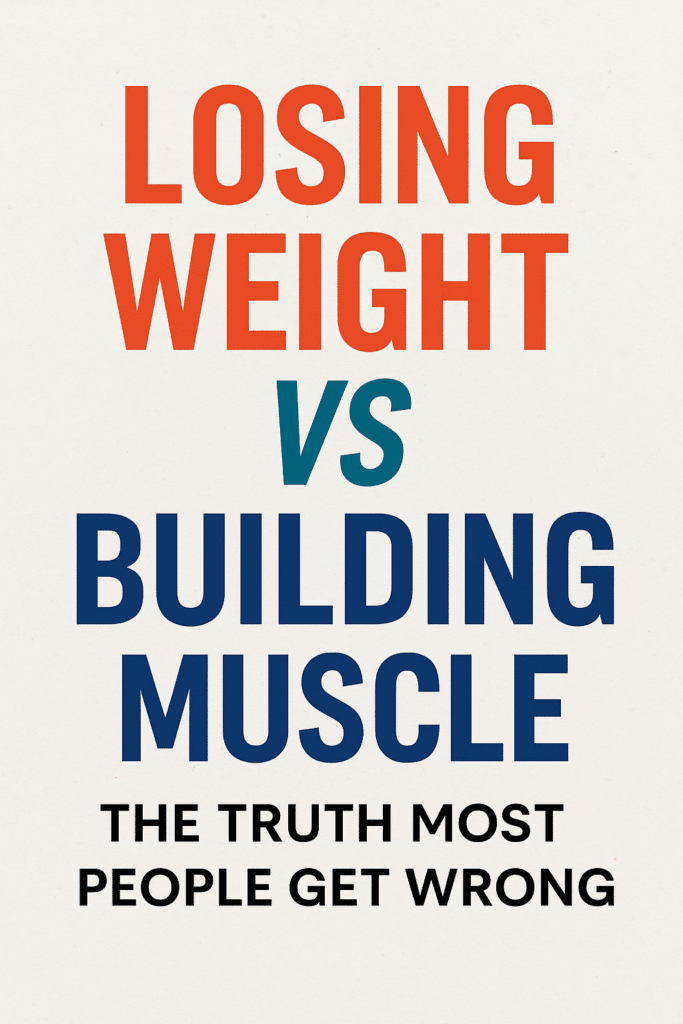Losing weight vs building muscle — which one is easier? Ask a hundred people and you’ll get a hundred different answers. Some will swear fat loss is brutal because of hunger and cravings. Others will argue muscle gain is a slow grind that takes years to notice.
I actually asked this exact question on Threads, but with a twist: “If you could lose 10 pounds of fat or build 10 pounds of muscle, which would you choose and why?” The responses were all over the place — and that’s when it hit me. This debate isn’t just about fitness, it’s about how people experience the process.
I’ve been on both sides of it. I was once the skinny guy eating everything in sight just to bulk up, and I’ve also cut weight when I needed to lean out. Both came with challenges I didn’t expect.
That’s why I wanted to write this post — not just with “textbook” answers, but with real talk and lessons from my own experience. So let’s break it down: Losing Weight vs Building Muscle — what’s actually easier, and what should you focus on first?
Why People Think Losing Weight Is Harder

When you look around, it seems obvious: most Americans are overweight or obese. If so many people struggle to get lean, then losing weight must be harder than building muscle, right? On the surface, that makes sense. But let’s dig in a little deeper.
For most people, losing weight feels like an uphill battle. On paper, it’s simple math: eat fewer calories than you burn, and you’ll lose fat. But in real life, it’s not that easy.
Hunger and cravings hit hard when you’re in a calorie deficit. Your body doesn’t like being in “survival mode,” so it pushes back with constant signals to eat. Add in late-night cravings, stress eating, or grabbing fast food with friends, and suddenly that calorie deficit feels impossible to stick to.
Food also isn’t just about fuel — it’s emotional. Comfort foods, cultural meals, and social eating all make dieting harder. Saying no to pizza at a party or skipping dessert when everyone else is indulging feels like punishment, not progress.
Then there’s the myth of a broken metabolism. Many people think their body just stops burning calories once they start dieting. The truth? Yes, your metabolism slows slightly as you lose weight, but not enough to make fat loss impossible. The real issue is consistency — staying in that deficit day after day, without letting life knock you off track.
So while muscle gain vs fat loss looks like an even debate, it’s no surprise most people think losing weight is harder. The math may be simple, but the discipline, cravings, and lifestyle changes make it one of the toughest battles in fitness.
Why People Think Building Muscle Is Harder

When the conversation shifts to building muscle vs losing weight, a lot of people argue that muscle gain is the harder road. And honestly, they have a point.
Unlike fat loss, where results can start showing in just a few weeks, muscle growth is a long game. For most natural lifters, adding noticeable size takes months or even years.
At first, you’ll get what’s called newbie gains — those quick results in your first 6–12 months of lifting. But the more experienced you get, the slower the progress becomes. Suddenly you’re working just as hard but fighting for smaller and smaller improvements. That’s where genetics kick in. We all have a natural cap on how much muscle our body can realistically build without performance-enhancing drugs, and once you’re close to that ceiling, every pound of muscle feels like a battle.
Nutrition is another challenge. To lose fat, you need to eat less. To gain muscle, you need to eat more — but not too much more. That means tracking your calories carefully to stay in a surplus without gaining excess fat. And let’s not ignore the cost: constant groceries, protein powders, and meal prep add up fast. (If you’re on a budget, here’s my guide to Affordable Protein Sources that can help.)
Finally, there’s the patience gap. With fat loss, the scale can drop quickly. With muscle gain, the progress is subtle — tighter sleeves, an extra 5 pounds on your bench press. Without visible results, it’s easy to lose motivation.
So while fat loss might feel like a daily battle against hunger, muscle gain feels like a marathon of patience, planning, and fighting against your body’s limits.
Misconceptions That Confuse the Debate

One reason the losing weight vs building muscle debate never seems to end is because there are so many myths floating around. People oversimplify both sides, and that just makes the conversation more confusing. Let’s clear a few of them up:
“You can easily do both at the same time.”
A lot of people believe in “body recomposition” — losing fat while building muscle at the same time. And yes, it’s possible, especially for beginners or people returning after a long break. But for most, muscle gain vs fat loss is a trade-off. You’ll make faster progress if you pick one goal at a time.
“Losing weight is just eat less, move more.”
Yes, a calorie deficit is the foundation of fat loss, but it doesn’t account for cravings, stress eating, hormones, or the fact that food is tied to emotions and social life. The “just eat less” mindset makes it sound easy, but anyone who’s tried knows it’s not.
“Building muscle is quick if you just lift weights.”
Here’s another myth. Lifting is the stimulus, but is it easier to lose fat or gain muscle? Most lifters will tell you muscle gain is slow. Without good nutrition, sleep, and progression, the process crawls. Even if you do everything right, results slow down over time.
“You can out-train a bad diet.”
Both sides of the debate suffer from this myth. Whether you’re trying to build muscle vs lose weight, diet is the foundation. You can’t expect to bulk up on fast food or lean out while binging snacks every night. Training matters, but nutrition decides your results.
“Quick fixes exist.”
This one fuels frustration on both ends. Fat loss supplements, crash diets, or “10 pounds of muscle in 30 days” programs sound tempting, but they set people up for disappointment. There are no shortcuts. Consistency and patience beat every “hack” you see online.
My Real Experience With Losing Weight vs Building Muscle
I was always a pretty skinny guy growing up, and I’m not the tallest either — so being short and skinny wasn’t exactly the combo I wanted. But hey, you can’t choose your genetics. All you can do is work with what you’ve got. Once I started making some money and could finally afford protein and a gym membership, the first thing on my mind was bulking up.
That’s when I made some mistakes. In the beginning, I thought eating anything would help me build muscle. I’d hit McDonald’s and crush dollar menu burgers (back when the dollar menu was still a thing) just to pack in extra calories. Sure, I gained weight, but a lot of it wasn’t muscle. I felt bloated and sluggish instead of strong.
Then came the mass gainer shakes. I’d mix scoops of powder with ice cream and milk, and some of those shakes were 2,500+ calories on their own. I’d down one in the morning, feel sick the rest of the day, and not even be hungry for real food. They “worked” in the sense that I put on 30–40 pounds, but it wasn’t quality weight. Looking back, I wouldn’t recommend anyone go that route. It taught me a hard lesson: building muscle isn’t just about eating more — it’s about eating smarter.
On the cutting side, the struggles were just as real. By this point I was stronger in the gym, but part of that strength came from simply weighing more. The heavier you are, the easier it is to move heavier weight. So when I started cutting, not only did the hunger and cravings kick in, but my lifts began to drop week after week. That crushed me mentally. I’d panic that I was losing all the muscle I worked so hard for, and more than once I gave in and started eating more again — not out of hunger, but out of fear.
Both bulking and cutting tested me in different ways. Bulking challenged my patience and my food choices. Cutting challenged my discipline, my mental toughness, and my ability to stay calm as my strength numbers fell. Neither one was easy — and neither gave me the quick win I was chasing.
The Real Answer — It Depends
When it comes down to losing weight vs building muscle, the truth is that neither one is universally harder. It really depends on you — your body type, your lifestyle, and your goals.
For someone who’s overweight, fat loss often feels more urgent and can actually come faster at first. If you’re carrying a lot of extra weight, creating a calorie deficit will usually lead to noticeable results within weeks. That early momentum is motivating. The challenge is keeping it off once the “easy pounds” are gone.
On the flip side, if you’re naturally skinny, muscle gain vs fat loss isn’t even a debate — building size will feel harder. Eating enough day after day, training consistently, and waiting months (or years) to see noticeable growth requires patience that most people don’t have. The results are slower and less obvious, which makes sticking with it a grind.
Another factor is lifestyle. Someone with a 9-to-5 job who sits most of the day may find fat loss harder because food is always within reach and activity is low. On the other hand, someone with a busy, active job might find it nearly impossible to eat enough food to consistently bulk.
Genetics also play a role. Some people pack on muscle more easily. Others seem to store fat faster or struggle with hunger cues when dieting. You can’t change your genetic blueprint, but you can maximize what you’ve got through training, nutrition, and consistency.
At the end of the day, whether it’s build muscle vs lose weight, the common thread is this: both are hard in their own way. Fat loss demands discipline against cravings and social pressures. Muscle gain demands patience, planning, and the mental toughness to push through slow results.
What You Should Focus On
After looking at both sides of the losing weight vs building muscle debate, here’s the honest truth: you’ll make faster progress if you pick one clear goal and stick with it for at least a few months. Trying to do both at the same time usually leaves you spinning your wheels.
So where should you start? It depends on your current situation:
- If you’re overweight: Focus on fat loss first. The extra weight puts stress on your joints and makes moving around harder. Dropping pounds will not only improve your health but also make future strength training feel easier. A calorie deficit, plenty of protein, and consistent activity are the keys here.
- If you’re lean but skinny: Building muscle should be your priority. Being underweight comes with its own health risks, and adding size will give you strength, confidence, and a better foundation for the future. That means eating in a calorie surplus, hitting your protein target, and following a structured lifting program.
- If you’re somewhere in between: You can focus on body recomposition — losing fat while gaining a little muscle. This works best for beginners, but progress will be slow. If you want faster results, commit to one direction: either a cut or a bulk.
No matter where you start, the key is consistency. Whether it’s muscle gain vs fat loss, results take time. Give yourself at least 90 days focused on one goal, track your progress, and adjust as needed.
A Quick Note on Tracking Progress
When you’re deciding between losing weight vs building muscle, it helps to know where you currently stand. Most people start with BMI (Body Mass Index), which compares your weight to your height.
Now, BMI can be a quick snapshot — but it has a big flaw. It doesn’t factor in muscle. For example, I’m technically “overweight” for my height according to BMI, but most of that is muscle. No one who looks at me would call me overweight. That’s why BMI can be misleading, especially if you train consistently.
For a clearer picture, I recommend using a smart scale. Unlike BMI, smart scales track body fat percentage, muscle mass, and other key metrics that actually matter for fitness.
This way, you get the best of both worlds: a simple BMI check to engage with, and accurate long-term tracking that tells you whether you’re really making progress.
FAQ: Losing Weight vs Building Muscle
Is it harder to lose weight or build muscle?
It depends on the person. If you’re overweight, fat loss often comes faster at first, but staying consistent is tough. If you’re naturally skinny, building muscle can feel harder because it takes months (or years) to see noticeable results. Both are challenging in their own way.
Which takes longer: fat loss or muscle gain?
Fat loss usually happens faster. With a proper calorie deficit, you can lose several pounds in a month. Muscle gain is much slower — most people can realistically build 1–2 pounds of muscle per month, especially after the “newbie gains” phase.
Can you lose fat and gain muscle at the same time?
Yes, it’s possible — especially if you’re new to training or coming back after time off. This is called body recomposition. But progress is usually slower compared to focusing on just one goal at a time.
Should you lose weight before building muscle?
If you’re overweight, it’s usually best to focus on fat loss first. Being leaner makes lifting and moving easier, and it’s healthier for your body overall. If you’re skinny with little muscle, focus on bulking first to build a solid foundation.
Is it easier to lose fat or gain muscle as you get older?
Losing fat tends to get harder with age because metabolism slows slightly and lifestyle factors (stress, sleep, family responsibilities) come into play. Building muscle also gets harder due to natural declines in hormones and recovery, but it’s absolutely still possible with consistent training and nutrition.
Conclusion: Losing Weight vs Building Muscle
So, what’s easier — losing weight or building muscle? The truth is, both come with their own challenges. Fat loss demands daily discipline against cravings, social events, and the mental grind of staying in a calorie deficit. Muscle gain demands patience, careful planning, and the willingness to push through slow progress.
For me personally, building muscle has always been harder. I’m a naturally smaller guy, and bulking up has taken years of consistency. But for you, it may be different. That’s why I’d love to hear from you — leave a comment below and let us know: Which one do you struggle with more, and why? We’re all here to help each other.
No matter which path you’re on, remember this: the body you want — a body you’re proud of — isn’t built in just one place. It’s built in the kitchen with proper nutrition. It’s built in your bed with proper rest. It’s built in the gym with proper training. And maybe most importantly, it’s built in your mind, with the belief that you have the power to change.
Stay consistent, stay patient, and trust the process. Action Creates Greatness.


